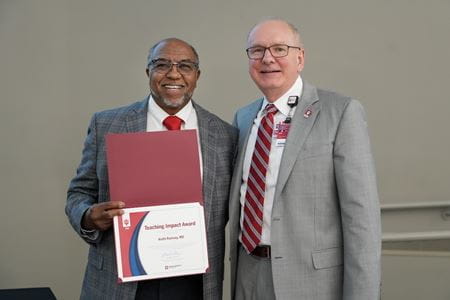School leadership
Earlier this year, Hess announced his plans to retire. A search committee has been launched to fill this important leadership role. The committee includes IU School of Medicine representation and is chaired by D. Wade Clapp, MD, senior associate dean for entrepreneurial research and commercialization, and Russell Mumper, PhD, vice president for research at IU. Several qualified candidates have already shown strong interest in the position. Hess said the medical school is in a strong position operationally and strategically as it approaches this transition.
New leaders
Bradley Allen, MD, PhD, was named Executive Associate Dean for Educational Affairs on Aug. 15. He has served in the interim role since fall 2024. In this role, Allen leads strategic initiatives to strengthen curriculum, enhance student success and align educational programs with IU Health and health care systems statewide.
Matthew J. Feinstein, MD, and Sara J. Pereira, MD, have been named co-directors of the IU School of Medicine-IU Health Cardiovascular Institute. Together, they will spearhead the enterprise's cutting-edge heart health research and patient care. Pereira, division chief of cardiothoracic surgery, was recruited from the University of Utah and earned her medical degree from the University of California at Irvine. Feinstein will start on Jan. 12 and is an expert in immunocardiology coming from the Northwestern University Feinberg School of Medicine, where he also earned his medical degree. He will be division chief of cardiovascular medicine at the IU School of Medicine.

Research funding and other budget impacts
IU School of Medicine continues to prioritize accelerating discovery and clinical translation — a priority generating more than $500 million in total funding last year. With the school’s robust research enterprise, the potential impact of substantive changes to federal research funding could be significant for the school. School leaders are actively tracking grants that have been lost and are working with government relations colleagues on paths forward. IU leadership is also working closely with Sen. Todd Young and other lawmakers to demonstrate the importance of research funding. The outlook for continued funding looks positive, Hess said.
Note that, per IU Policy GR-01, employees must coordinate with the Office of the Vice President for University Relations before contacting government officials on IU’s behalf. This applies to meetings, testimony, presentations, communications, event invitations and campus events. This also covers responses to information requests and state contracts.

A variety of changes have impacted the school’s budget this year beyond the changes to research funding. The new university budgeting model is impacting assessments, and there is a state budget reduction of 10% to IU. School and university leaders are continuing to evaluate opportunities to work more efficiently and proactively to address the impact of this new allocation from the state and have collaborated to identify savings and efficiencies. The school’s favorable financial position allows continued work while adapting to the new budget.
New legislation: Post-tenure review
“Productivity review” provisions for tenured faculty have been added to the state budget bill. In response, the IU Board of Trustees adopted a post-tenure review policy requiring annual activity reports and five-year productivity summaries. Implementation details are still being finalized. Look for further guidance on reporting and the appeals process to come. Post-tenure productivity reviews will begin in spring 2026.
Incident Command overview
Incident Command is a body that approves responses to new and proposed changes to the environment that are dramatically impacting the School of Medicine. The group is comprised of the dean, executive associate deans, the executive director of strategic communications, representatives from the general counsel’s office and others, as needed. Incident Command provides regular updates on emerging issues to the school’s senior leadership and allows opportunities for discussion, development of contingency plans and decisions on courses of action.
Advances in AI
The departments of pathology, radiology and neurosurgery are currently incorporating AI into their clinical work. As this technology continues to develop, the university is offering a free, self-paced online course, GenAI 101, to anyone in the IU community. Additionally, an AI Governance Committee has been formed, consisting of education, clinical, research and IT leaders to focus on policies and guidance for faculty, staff and students.
Strategic Plan: Student Success

LCME accreditation
The Liaison Committee on Medical Education completed its site visit in March 2025 and will make its final decision in October. Feedback from the site visit team has been extremely positive, Hess said. IU School of Medicine received the LCME’s preliminary report in August, which contained few elements of concern.
Fall enrollment
IU School of Medicine continues to see a high level of demand with a 23% increase in applications. The school maintains its status as the nation’s largest medical school with 365 incoming medical students. About 88% are from Indiana, and nearly a quarter are from medically underserved areas, including rural areas of the state — a critical step to increasing the number of physicians who ultimately practice in those areas. The School of Medicine offers a variety of degree programs spanning from associate degrees to doctoral degrees. For the second straight year, the school has seen an increase in its graduate student population, which includes master’s and PhD programs. Total school enrollment is 2,242.
IU Indianapolis is offering a new B/MD pathway. Qualified freshmen who are directly admitted to the School of Science will be provided with conditional admission to the MD program. So far, over 300 students have applied to the program from across the country.
Strategic Plan: Research Growth
Expanding clinical trials
Indiana residents Sarah and John Lechleiter and Deborah and Randall Tobias have partnered on a $20 million gift commitment to IU Health and IU School of Medicine to establish the Institute for Clinical Innovation. IU Health will match the gift, bringing the total impact to $40 million. This gift supports joint efforts to expand clinical trial participation through the state. The institute aims to engage 75,000 patients annually in studies and grow the Indiana Biobank to 300,000 participants in five years.
IU School of Medicine and IU Health leaders are collaborating to grow the clinical research enterprise. Jim McGill, MD, executive director of clinical research for IU Health, will explore how to spread clinical trials statewide and make the enterprise more attractive to pharmaceutical companies. Bryan Schneider, MD, the inaugural associate dean of clinical trials at IU School of Medicine, will be the school’s lead liaison for industry-sponsored trials, initially working with Eli Lilly and Company. In this strategic leadership role, Schneider will collaborate with faculty across IU School of Medicine, IU Health and the IU LAB to drive prioritization, startup and patient enrollment in clinical trials.
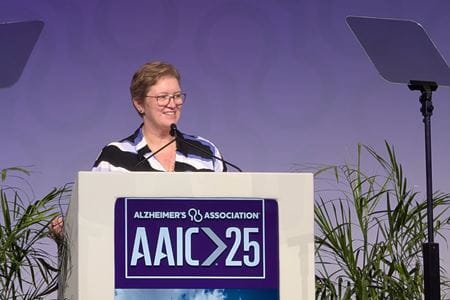
IU School of Medicine and IU Health have jointly developed prioritization and a “top 10” list of clinical studies in cancer, cardiovascular disease, neuroscience and pediatrics based on these studies’ innovation and impact.
International research honors
IU School of Medicine faculty delivered more than 150 presentations at the Alzheimer’s Association International Conference in Toronto. IU leaders received two of the six major awards given at the conference. Donna Wilcock, PhD, received the Bill Theis Award for distinguished service to the international community. Bruce Lamb, PhD, received the Zaven Khachaturian Award for transformative leadership in Alzheimer’s disease research.
Strategic Plan: Improving health and wellness
Residency program expansions
Two new Bloomington-based residency programs have gained ACGME accreditation: internal medicine and emergency medicine. The internal medicine program will train eight residents per class, and the emergency medicine program will train six. Both will start in July 2026. These IU Health-affiliated programs will provide new doctors across areas of need in the state, particularly rural areas.
Expansion of residency programs at regional campuses provides a boost to the physician workforce in key areas. In addition to the two new Bloomington residencies, existing regional programs include:
- Internal medicine — Muncie and Southwest Indiana
- Psychiatry — Merrillville and Vincennes
- Family medicine — Jasper, Lafayette and Muncie
- Transitional year — Muncie
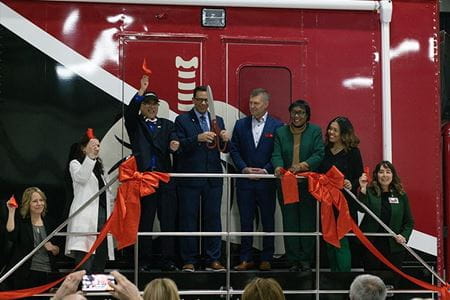
Lung cancer screening
In March, IU Health launched a 40-foot mobile lung screening unit with a CT scanner, bringing lung screenings directly to communities across Indiana. About 2,000 scans are expected this year for individuals at high-risk for lung cancer. The effort was supported by the Tom and Julie Wood Family Foundation and IU Health and is led by Nasser Hanna, MD, professor of medicine and a member of the IU Melvin and Bren Simon Comprehensive Cancer Center.
Innovation in stroke care
The IU School of Medicine-IU Health Neuroscience Institute launched a Telestroke program in August for the south region of Indiana. Stroke is a race against time. Immediate access to neurologists can mean the difference between independence and disability. This program extends the service of board-certified neurovascular neurologists to rural communities. In essence, it is bringing the expert to the patient rather than moving the patient to the expert, sometimes hours away.
The pilot program has already impacted 160 patients in rural community hospitals. It is preventing unnecessary patient transfers and improving transfer time for those who do need higher acuity care. Success in the south region sets the stage to expand the Telestroke program to more Hoosiers statewide. Ann Jones, MD, assistant professor of clinical neurology, directs the program.
Research discoveries
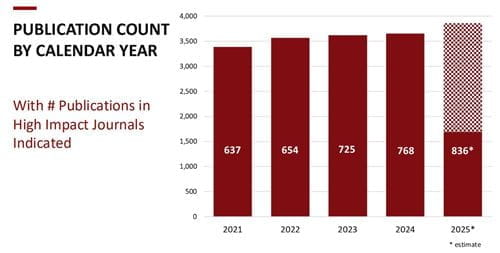 Grant proposals to the National Institutes of Health, as well as non-NIH proposals, have continued to increase over the past five years, totaling $566 million and $361 million, respectively, in 2024. Writing grant proposals and publishing in respected medical journals are important during a time when research funding is being jeopardized, said Tatiana Foroud, PhD, executive associate dean for research affairs.
Grant proposals to the National Institutes of Health, as well as non-NIH proposals, have continued to increase over the past five years, totaling $566 million and $361 million, respectively, in 2024. Writing grant proposals and publishing in respected medical journals are important during a time when research funding is being jeopardized, said Tatiana Foroud, PhD, executive associate dean for research affairs.
Last year, 768 IU School of Medicine faculty published in high-impact journals, and that number is projected to grow to 836 for 2025. Notable IU faculty publications include research on retinal dysfunction in Alzheimer’s disease, published in Alzheimer’s and Dementia: The Journal of the Alzheimer’s Association; a study on uric acid levels in children with severe malaria, published in Nature Medicine; and research into metabolic response in kidney epithelial cells, published in The Journal of Clinical Investigation.
Faculty recognition
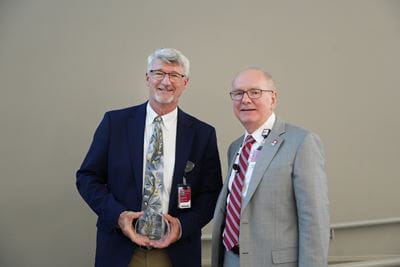
Excellence in Faculty Mentoring Award
- James C. Williams, PhD — Anatomy, Cell Biology and Physiology
- Christopher M. Callahan, MD — Department of Medicine
Outstanding Community Engagement Award
- Christian C. Stachan, MD — Emergency Medicine Research
Laboratory Excellence Award
- Melissa Kacena, PhD — Orthopaedic Surgery
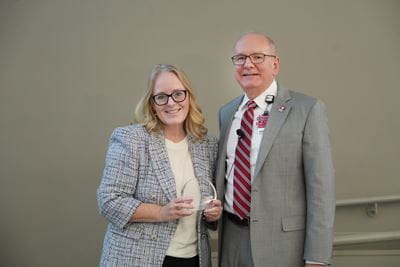
Inspirational Educator Award
- Jennelle Richardson, PhD (over 10 years) — Biochemistry, Molecular Biology and Pharmacology
- Julia LaMotte, PhD (less than 10 years) — Pediatrics
Scholar Educator Award
- E. Matthew Ritter, MD — Surgery
Teaching Impact Awards
Formerly called the Volunteer and Adjunct Faculty Teaching Awards, the Teaching Impact Awards honors those faculty who have a positive impact on learning through the direct teaching of IU School of Medicine medical students or residents across the state. This year, 42 faculty were recognized.
Staff recognition
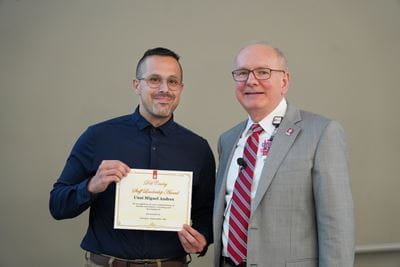
Deb Cowley Staff Leadership Award
- Unai Miguel Andres — Pediatrics/Children’s Health Services Research
- Ashley Dummer — Department of Pediatrics
- Lane Mahurin — Research Administration
Lynn Wakefield Unsung Hero Staff Award
- Kevin Tamosaitis — Emergency Medicine
- Marissa Lowe — Neurological Surgery
Outstanding Community Engagement Award
- Stephanie Marshall — Faculty Affairs and Professional Development
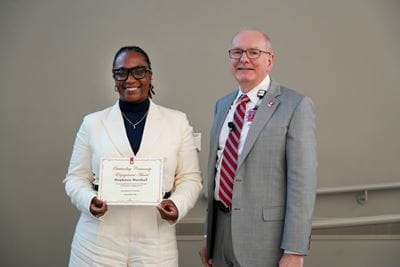
Milestone Anniversaries
IU School of Medicine recognized staff hitting the milestones of 15, 20, 25, 30, 35 and 40 years of service. Those marking 40 years in 2025 are:
- Barbara Glick-Wilson — Radiology and Imaging Sciences
- Jacqueline Jackson — Medical and Molecular Genetics/Hereditary Genomics
- Ann Klipsch — Pediatrics/Gastrointestinal Diseases
Emerging Leaders
The Emerging Leaders program, sponsored by IU School of Medicine Human Resources, is a two-year program established to promote professional growth and leadership skills among staff members demonstrating potential to advance to higher leadership roles. The 2025 cohort includes:
- Crystal Baker — Medical and Molecular Genetics
- Laura Bergdoll — General Internal Medicine
- Jackie Boese — Pediatrics Chairman’s Office
- Nate De Jong — Pediatric Endocrinology/Diabetology
- Emily Diko-Helm — Medicine-Financial Services
- Diont’e Keys — Medical and Molecular Genetics
- Emilie Lanthier Garrison — General Internal Medicine
- Kirsten Ryan — Pediatric Intensive and Critical Care
- Mykayla Moore — Family Medicine
- Stephanie Wallace — Medicine Chairman’s Office

Did you miss the meeting?
Watch the video of the IU School of Medicine Fall 2025 All School Meeting.
